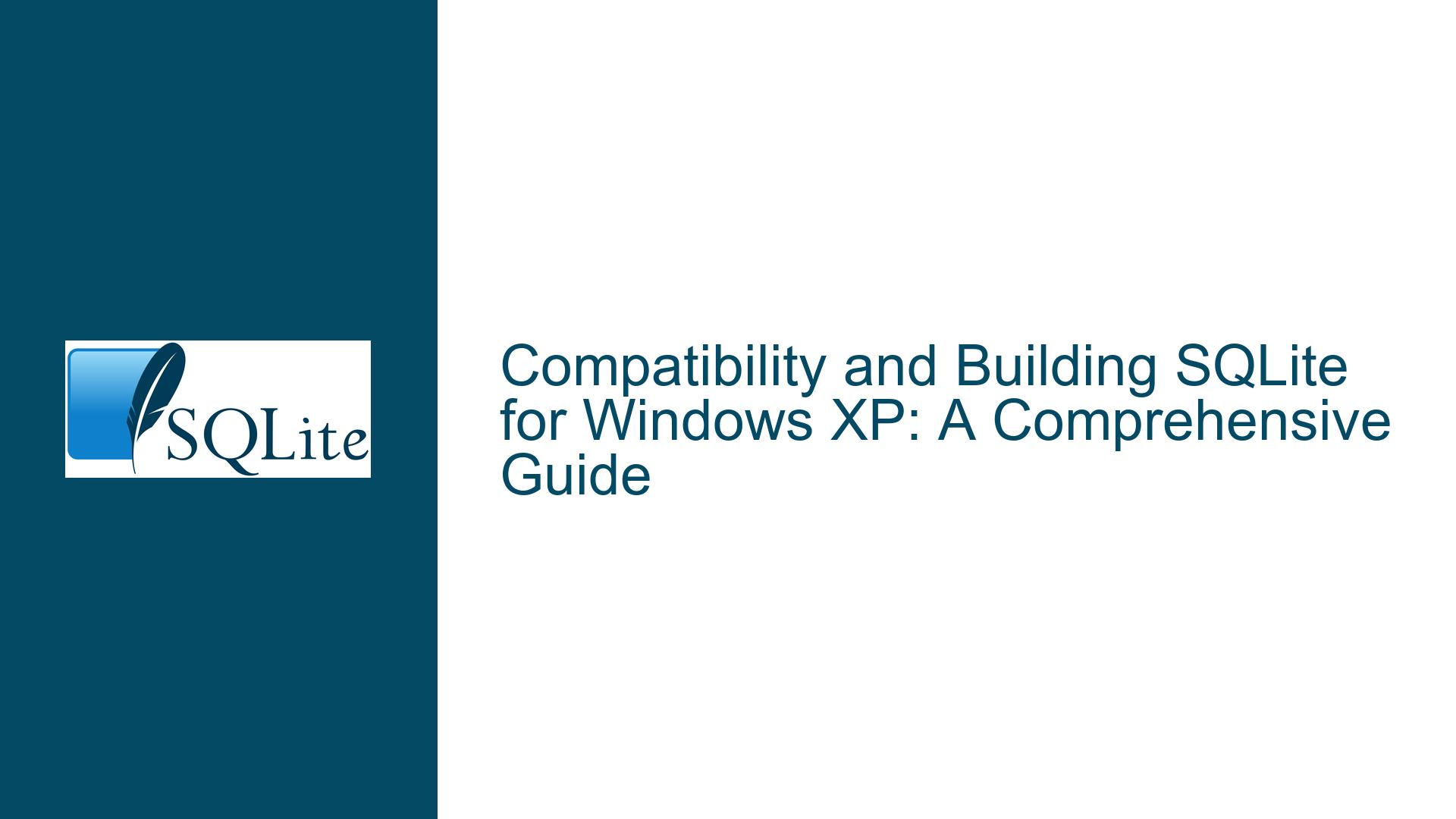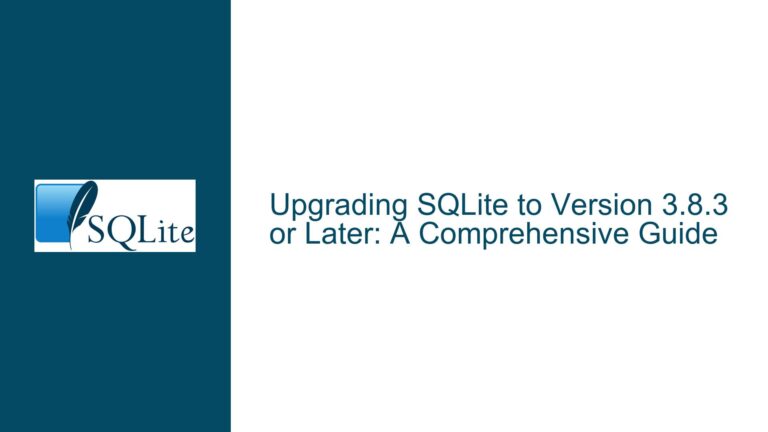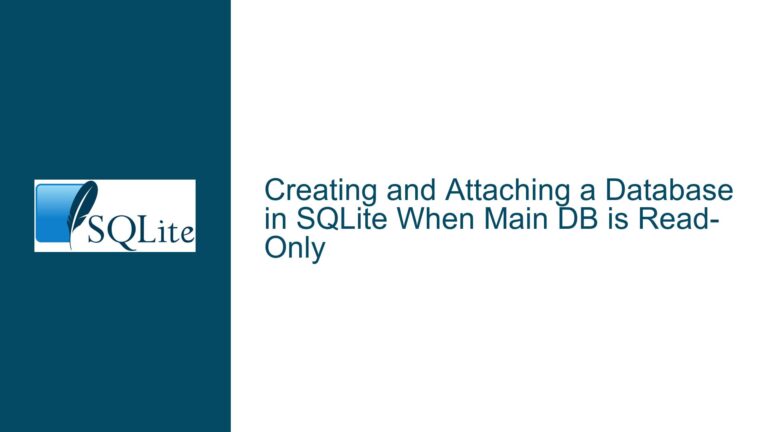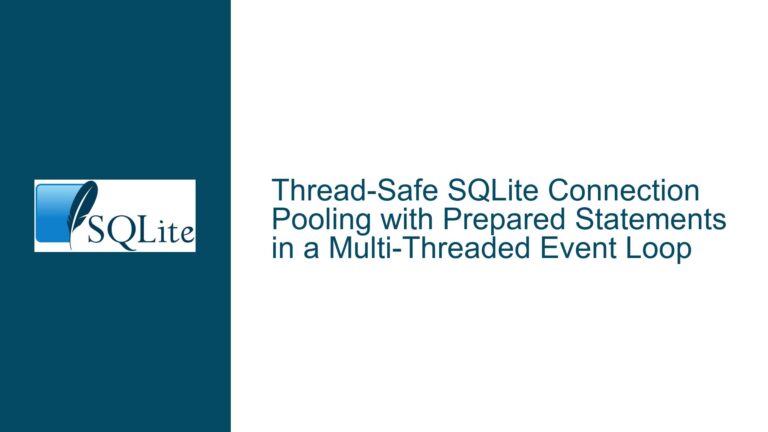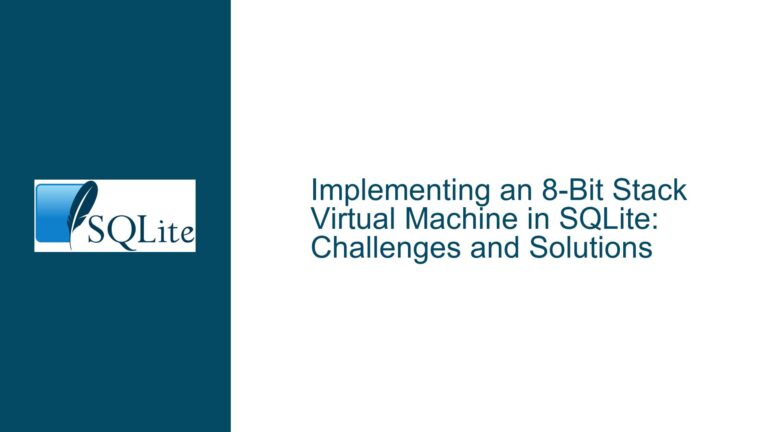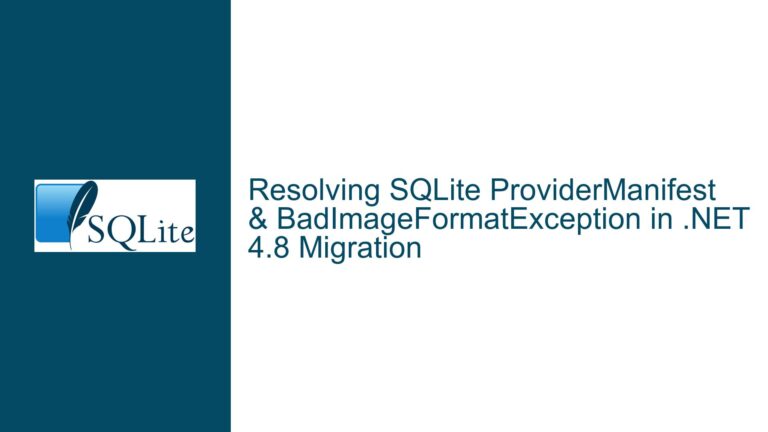Compatibility and Building SQLite for Windows XP: A Comprehensive Guide
Understanding SQLite Compatibility with Windows XP
SQLite, being a lightweight, serverless, and self-contained database engine, is widely used across various platforms, including legacy systems like Windows XP. However, as modern software development increasingly moves away from older operating systems, compatibility issues arise. Windows XP, released in 2001, is no longer supported by Microsoft, and many modern tools and libraries have dropped support for it. This creates challenges for users who need to run SQLite on such legacy systems.
The core issue revolves around the compatibility of SQLite binaries and source code with Windows XP. While SQLite itself is written in ANSI C and is generally conservative in its use of modern C features, the build environment and runtime dependencies can pose significant hurdles. Specifically, the availability of compatible C compilers, runtime libraries, and the ability to cross-compile or patch SQLite for Windows XP are critical factors.
This guide will delve into the nuances of SQLite compatibility with Windows XP, exploring the underlying causes of potential issues and providing detailed troubleshooting steps and solutions. Whether you are a beginner or an experienced developer, this guide aims to equip you with the knowledge to successfully run SQLite on Windows XP.
Challenges in Building and Running SQLite on Windows XP
The primary challenges in running SQLite on Windows XP stem from the following factors:
Compiler and Runtime Library Limitations: Windows XP has limited support for modern C compilers and runtime libraries. The last version of the Visual C++ Redistributable that works on Windows XP is from Visual Studio 2019 version 16.7 (file versions starting with 14.27). This restricts the ability to build or run newer versions of SQLite that may rely on features introduced in later versions of the runtime libraries.
32-bit vs. 64-bit Architecture: Windows XP was primarily a 32-bit operating system, with a 64-bit version available but less common. Many pre-built SQLite binaries are now distributed as 64-bit, which are incompatible with 32-bit Windows XP systems. This necessitates building SQLite from source for 32-bit systems or finding older pre-built 32-bit binaries.
Dependency on Modern APIs: As SQLite evolves, it may begin to rely on newer Windows API functions that are not available on Windows XP. For example, functions like
InitializeCriticalSectionExare not present in Windows XP, requiring patches or workarounds to maintain compatibility.Cross-Compilation and Patching: Building SQLite for Windows XP on a modern system often requires cross-compilation or patching the source code to remove dependencies on modern features. This can be a complex process, especially for beginners.
Pre-built Binaries and Tools: While pre-built SQLite binaries are convenient, they are often not available for older systems like Windows XP. This forces users to either find older versions of SQLite that are compatible or build SQLite from source.
Detailed Troubleshooting Steps and Solutions
Step 1: Determine Your System Architecture and Requirements
Before attempting to run SQLite on Windows XP, it is essential to determine whether your system is 32-bit or 64-bit. This will dictate which versions of SQLite and associated tools you can use. To check your system architecture:
- Navigate to Control Panel > System. Under the General tab, look for the system type. If it states "x64 Edition," your system is 64-bit; otherwise, it is 32-bit.
If your system is 32-bit, you will need to use 32-bit versions of SQLite and any associated tools. If it is 64-bit, you can use either 32-bit or 64-bit versions, but 64-bit versions are generally preferred for performance reasons.
Step 2: Identify Compatible SQLite Versions
The last version of SQLite known to be fully compatible with Windows XP is SQLite 3.8.11.1, released in 2014. However, some users have reported success with newer versions, such as SQLite 3.47.2, with appropriate patches and build configurations. To ensure compatibility, consider the following options:
Use SQLite 3.8.11.1: This version is known to work well on Windows XP and is available as a pre-built binary. You can download it from the SQLite website.
Build SQLite from Source: If you need a newer version of SQLite, you may need to build it from source. This requires a compatible C compiler and runtime libraries, as well as potential patches to the SQLite source code.
Step 3: Set Up a Compatible Build Environment
To build SQLite from source on Windows XP, you will need a compatible C compiler and build tools. The following options are available:
Visual C++ 2005: This is one of the last versions of Visual Studio that fully supports Windows XP. It can be used to build SQLite versions up to 3.31 (released in 2020).
Windows Driver Kit (WDK) 7.1.0: This toolkit includes a compatible C compiler and build tools for Windows XP. It is a preferred option for building small Win32 programs, including SQLite.
MinGW or Cygwin: These GNU environments for Windows provide build tools that can be used to compile SQLite. However, they also have limited support for Windows XP, so you may need to use older versions.
Once you have set up your build environment, download the SQLite source code from the SQLite website and apply any necessary patches to ensure compatibility with Windows XP.
Step 4: Apply Patches for Windows XP Compatibility
If you are building a newer version of SQLite, you may need to apply patches to ensure compatibility with Windows XP. The following are common issues and their corresponding patches:
ANSI C-89 Conformance: Some newer versions of SQLite may use C features that are not supported by older compilers. You may need to modify the source code to ensure ANSI C-89 conformance, such as moving variable declarations to the beginning of blocks.
Missing API Functions: If SQLite relies on newer Windows API functions that are not available on Windows XP, you will need to patch the source code to use alternative functions. For example, replace
InitializeCriticalSectionExwithInitializeCriticalSection.Compiler-Specific Issues: Some compilers, such as Visual C++ 2005, may require additional patches to handle specific issues. For example, you may need to define
INFINITYandNANmanually or disable specific compiler warnings.
The following is an example patch for SQLite 3.46 to ensure compatibility with Windows XP:
Index: extsrc/shell.c
==================================================================
--- extsrc/shell.c
+++ extsrc/shell.c
@@ -450,19 +450,21 @@
/*
** Work-alike for fgets() from the standard C library.
*/
char *sqlite3_fgets(char *buf, int sz, FILE *in){
if( UseWtextForInput(in) ){
+#ifndef SQLITE_USE_STDIO_FOR_CONSOLE
+ DWORD nRead = 0;
+#endif
/* When reading from the command-prompt in Windows, it is necessary
** to use _O_WTEXT input mode to read UTF-16 characters, then translate
** that into UTF-8. Otherwise, non-ASCII characters all get translated
** into '?'.
*/
wchar_t *b1 = sqlite3_malloc( sz*sizeof(wchar_t) );
if( b1==0 ) return 0;
#ifndef SQLITE_USE_STDIO_FOR_CONSOLE
- DWORD nRead = 0;
if( IsConsole(in)
&& ReadConsoleW(GetStdHandle(STD_INPUT_HANDLE), b1, sz, &nRead, 0)
){
b1[nRead] = 0;
}else
@@ -526,10 +528,13 @@
if( !UseWtextForOutput(out) ){
/* Writing to a file or other destination, just write bytes without
** any translation. */
return fputs(z, out);
}else{
+#ifndef SQLITE_STDIO_FOR_CONSOLE
+ DWORD nWr = 0;
+#endif
/* One must use UTF16 in order to get unicode support when writing
** to the console on Windows.
*/
int sz = (int)strlen(z);
wchar_t *b1 = sqlite3_malloc( (sz+1)*sizeof(wchar_t) );
if( b1==0 ) return 0;
sz = MultiByteToWideChar(CP_UTF8, 0, z, sz, b1, sz);
b1[sz] = 0;
#ifndef SQLITE_STDIO_FOR_CONSOLE
- DWORD nWr = 0;
if( IsConsole(out)
&& WriteConsoleW(GetStdHandle(STD_OUTPUT_HANDLE),b1,sz,&nWr,0)
){
/* If writing to the console, then the WriteConsoleW() is all we
** need to do. */
@@ -1580,10 +1584,13 @@
**
** Use the C-library printf() function to convert real value X into a string.
** Used for comparing the accuracy of SQLite's internal float-to-text conversion
** routines against the C-library.
*/
+#if _MSC_VER==1500
+#define snprintf _snprintf
+#endif
static void shellDtostr(
sqlite3_context *pCtx,
int nVal,
sqlite3_value **apVal
){
@@ -10190,11 +10197,13 @@
SQLITE_EXTENSION_INIT1
#include <stdio.h>
#include <string.h>
#include <assert.h>
#ifndef SQLITE_NO_STDINT
+#if _MSC_VER>1500
# include <stdint.h>
+#endif
#endif
#include <zlib.h>
/* When used as part of the CLI, the sqlite3_stdio.h module will have
@@ -16706,10 +16715,13 @@
}
/*
** File control method. For custom operations on an vfstrace-file.
*/
+#if _MSC_VER==1500
+#define strtoll _strtoi64
+#endif
static int vfstraceFileControl(sqlite3_file *pFile, int op, void *pArg){
vfstrace_file *p = (vfstrace_file *)pFile;
vfstrace_info *pInfo = p->pInfo;
int rc;
char zBuf[100];
@@ -23887,10 +23899,16 @@
**
** No bindings occur if this table does not exist. The name of the table
** begins with "sqlite_" so that it will not collide with ordinary application
** tables. The table must be in the TEMP schema.
*/
+/* NOTE: Also see the `test-inf-nan.c' test program. */
+#if _MSC_VER==1500
+#pragma warning(disable : 4756)
+#define INFINITY ((float)(1e+300 * 1e+300))
+#define NAN ((float)(INFINITY * 0.0F))
+#endif
static void bind_prepared_stmt(ShellState *pArg, sqlite3_stmt *pStmt){
int nVar;
int i;
int rc;
sqlite3_stmt *pQ = 0;
@@ -23938,10 +23956,13 @@
}
sqlite3_reset(pQ);
}
sqlite3_finalize(pQ);
}
+#if _MSC_VER==1500
+#pragma warning(default : 4756)
+#endif
/*
** UTF8 box-drawing characters. Imagine box lines like this:
**
** 1
Index: extsrc/sqlite3.c
==================================================================
--- extsrc/sqlite3.c
+++ extsrc/sqlite3.c
@@ -14267,11 +14267,16 @@
** the SQLITE_DISABLE_INTRINSIC define.
*/
#if !defined(SQLITE_DISABLE_INTRINSIC)
# if defined(_MSC_VER) && _MSC_VER>=1400
# if !defined(_WIN32_WCE)
+#if _MSC_VER==1500
+# include <stdlib.h>
+# include <emmintrin.h>
+#else
# include <intrin.h>
+#endif
# pragma intrinsic(_byteswap_ushort)
# pragma intrinsic(_byteswap_ulong)
# pragma intrinsic(_byteswap_uint64)
# pragma intrinsic(_ReadWriteBarrier)
# else
@@ -24985,11 +24990,15 @@
** localtime_s().
*/
#if !HAVE_LOCALTIME_R && !HAVE_LOCALTIME_S \
&& defined(_MSC_VER) && defined(_CRT_INSECURE_DEPRECATE)
#undef HAVE_LOCALTIME_S
+#if _MSC_VER==1500
+#define HAVE_LOCALTIME_S 0
+#else
#define HAVE_LOCALTIME_S 1
+#endif
#endif
/*
** The following routine implements the rough equivalent of localtime_r()
** using whatever operating-system specific localtime facility that
Step 5: Test and Validate the Build
After applying the necessary patches and building SQLite, it is crucial to test the resulting binaries on your Windows XP system. Run the SQLite command-line interface (CLI) and execute a series of basic SQL commands to ensure that the database engine functions correctly. Additionally, test any applications that rely on SQLite to verify that they work as expected.
If you encounter issues, review the build logs and error messages to identify the root cause. Common issues include missing dependencies, incorrect compiler flags, or incomplete patches. Make the necessary adjustments and rebuild SQLite as needed.
Step 6: Consider Alternative Solutions
If building SQLite from source proves too challenging, consider the following alternative solutions:
Use Older Pre-built Binaries: As mentioned earlier, SQLite 3.8.11.1 is known to work well on Windows XP. If your requirements allow, using this version may be the simplest solution.
Virtual Machines or Emulators: If you have access to a modern system, consider running Windows XP in a virtual machine or emulator. This allows you to use modern tools and libraries while still supporting legacy applications.
Port Applications to Newer Systems: If possible, consider porting your applications to a newer version of Windows or a different operating system. This will allow you to take advantage of the latest features and security updates.
Conclusion
Running SQLite on Windows XP is a challenging but achievable task. By understanding the limitations of the operating system, setting up a compatible build environment, and applying necessary patches, you can successfully build and run SQLite on this legacy platform. Whether you choose to use pre-built binaries or build from source, this guide provides the detailed steps and solutions needed to overcome the hurdles associated with Windows XP compatibility.
